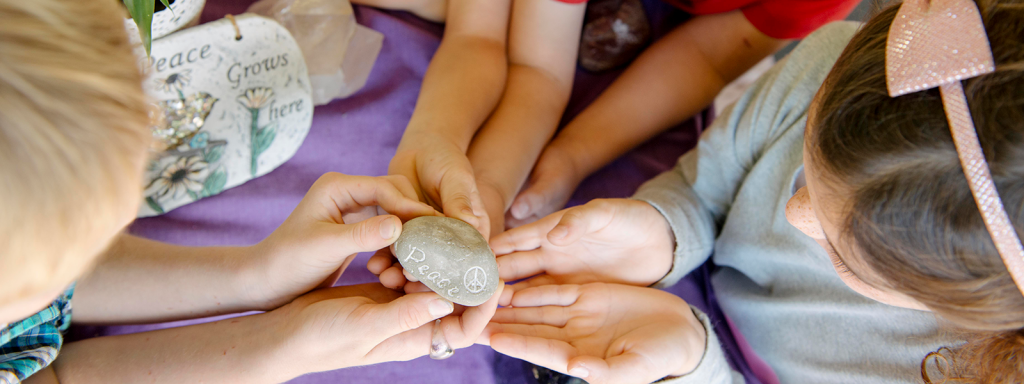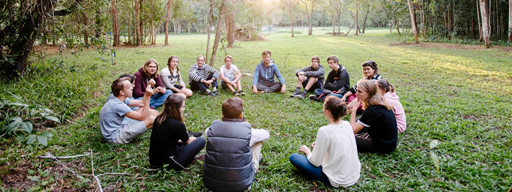At MIC we have a whole school approach to behaviour support that is known as Restorative Practice.
Restorative Practice is a shared set of values in the hearts and minds of everyone in our College community that ensures we all have a shared understanding and shared beliefs around discipline and behaviour support. It is a philosophy in action that incorporates a continuum of processes that places relationships at the heart of the educational experience. Classroom management practices are relationship-centred so that conflicts are resolved with a focus on repairing the harm done to others in a way that influences positive behaviour and builds a safe, productive and caring community.
It is based on the premise that children need to be explicitly taught the the skills they need to behave appropriately and manage conflicts.

Traditional versus Restorative Practice
When it comes to helping children to learn to behave, traditional approaches often rely on retributive justice. This is based on age-old justice systems that make the (mistaken) assumption that those harmed are ‘helped’ by the punishment of the perpetrator.
Questions asked in traditional settings include – What rules were broken? Who is to blame? What punishment should apply? The focus is on stopping the behaviour – the cause is rarely addressed and there is little opportunity for self-reflection or taking responsibility. The main lesson learnt is: don’t get caught.
The Restorative Practice we utilise at MIC asks different questions – Who was harmed? How were they affected? What part did each person play in the incident? Whose obligation is it to make it right? How can the relationship be restored? The focus is on changing the behaviour as it addresses the cause and provides an opportunity to understand the broader ramifications for both self and others. Participants are encouraged to self-reflect and take responsibility for their actions. They learn about themselves and others and self-esteem is built, rather than diminished.
Conflicts are a learning opportunity
At MIC conflicts are considered a learning opportunity and students are explicitly taught the skills they need to behave appropriately, just as they are taught the skills they need to read, write, multiply or divide.
Restorative Practice focuses on the learning opportunity that is presented, rather than a focus on blame or punishment, and is based on three pillars:
- It addresses the needs of the person who was harmed
- It addresses the needs of the person who did the harming
- It addresses restitution – restoring the relationship.
Students learn how to participate with others, resolve conflicts, self manage, negotiate, collaborate, feel empowered, see their own part (and move away from blame/victim thinking), make amends and restore relationships. The skills required are explicitly taught in a developmentally appropriate way.
While it can be difficult to self-reflect, admit where we are wrong, see how others are affected by our own behaviour, accept accountability and responsibility for our actions and to heal the harm by making amends and putting things right – it is by adopting these approaches that all involved are able to develop the strength of character to participate positively in challenging situations with an approach that fosters understanding, clarification and forgiveness.
From role modelling, to using peace tables to resolve conflicts, to holding no-blame whole class meetings, to discussing individual obligations and responsibilities – Restorative Practice is a whole school approach that is utilised as part of everyday college life and is based on the principles of:
- connectedness
- empowerment
- respect
- acceptance
- willingness
- open mindedness
- humility
- solvability
- compassion
- courtesy
- patience
- empathy
- kindness
- resilience
- fairness
- peacemaking.

How is Restorative Practice used to manage bullying at MIC?
As Restorative Practice approaches are part of everyday life at MIC, the values it embodies are a fundamental aspect of our college culture across all ages and learning environments. All staff have engaged in Restorative Practice training and also attend refresher training on a regular basis. As a result, all community members engage in inclusive approaches every day.
However, when a conflict or bullying circumstance becomes evident, a Responding Continuum is adopted with a range of approaches utilised depending on the nature of the incident. This continuum ranges from minor incidents (such as name calling) where a “Connect before Correct” technique is used, through to an Informal Restorative Chat with those involved (exploring what happened, how it affected those involved and what each party can do to make it right), to a No Blame Classroom Meeting, or a Formal Restorative Chat.